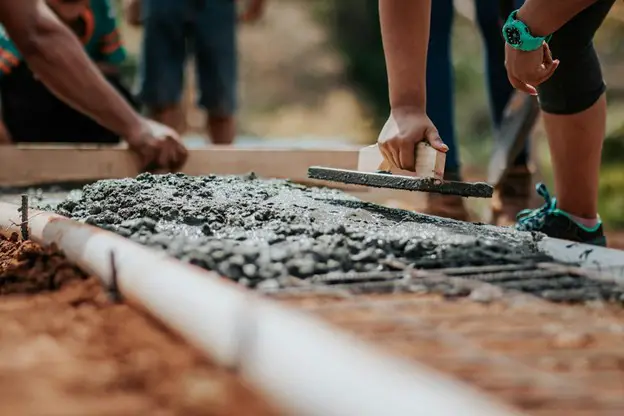Building permits tips for aspiring builders guide, House construction advice, Useful property renewal tips, Home remodel
Building Permits: 6 Useful Tips for Aspiring Builders
11 February 2024
Embarking on a construction project is a blend of excitement and complexity that can quickly become overwhelming without the right preparations. For any aspiring builder, navigating the realm of building permits is a crucial early step. Yet, the process often appears shrouded in red tape and mystery, leading to delays, fines, and potentially more headaches than the builder had bargained for.
In this comprehensive guide, we’ll demystify building permits and provide essential tips to help you secure these all-important documents efficiently. Whether you’re planning to build from the ground up or undertake a significant renovation, these insights will ensure that you’re treading the regulatory quagmire confidently and legally. Let’s dive in!
Tip 1: Research Local Building Codes
Before pouring a foundation or knocking down a single wall, it’s paramount to understand the building codes that govern your area. Municipalities have specific requirements regarding materials, techniques, and even the types of structures that can be built. Sometimes these restrictions are aimed at preserving the local aesthetic, promoting safety, or ensuring environmental sustainability.
Understanding the local regulations begins with:
- A visit to the local planning department or a comprehensive online search of the municipal codes.
- Consulting with architects or contractors experienced in the area.
- Joining local builders or real estate groups where information and experiences are often shared.
By becoming well-versed in local building codes, you’ll avoid surprises that can derail your plans and budget, such as discovering an essential feature of your design is not permitted in your area.
Tip 2: Prepare Detailed Plans and Documentation
The adage “measure twice, cut once” is particularly relevant when dealing with building permits. Any structural or significant cosmetic change to a property typically requires architectural blueprints or professional design plans. These designs must not only be detailed but also compliant with the previously researched local building codes.
Your preparation should include:
- Detailed drawings that specify dimensions, materials, and construction techniques.
- Properly calculated project sizes and scopes to match zoning requirements.
- Ensuring your plans are reviewed and signed off by a professional architect or engineer where necessary.
Having incomprehensive plans rejected can be costly in terms of both time and resources. A thorough and compliant plan on the first submission will move your project forward without avoidable delays.
Tip 3: Look for an Expeditor
Navigating the paperwork and processes associated with building permits can be a job in itself. Recognizing the complexity and time sensitivity often involved, many builders opt to enlist the services of a permit expedited.
An expediter specializes in managing the permit process, understanding the intricacies and demands of different authorities, and knowing how to work within the system to achieve the fastest possible outcome. As this San Francisco permit expediter explains, they can help you with everything from obtaining necessary approvals to resolving any issues that may arise. Expedited building permits can be a game-changer, as they allow you to start construction sooner and keep your project on track. However, do note that expediters charge an additional fee for their services, so ensure this expense is budgeted before engaging one.
Tip 4: Submit Complete and Organized Permit Applications
“Organization is key” applies to more than just the building itself. Submitting a permit application that is organized and complete is crucial.
This entails:
- Ensuring all required documents are included and up-to-date.
- Filling out paperwork legibly and accurately.
- Labeling all documents clearly so that administrative staff can quickly match requirements with your submission.
An incomplete application may not even be reviewed, meaning all of your preparation was for naught. Moreover, a messy submission can indicate a lack of professionalism, which may not bode well for the perception of your handling of the project itself.
Tip 5: Allow Sufficient Time for Permit Approval
The permit process, infamous for its slow pace akin to that of a glacial movement, can often test your patience. Despite your diligent efforts, it is not uncommon to encounter delays in the approval process, particularly in areas bustling with high volumes of construction activities.
To manage this slow churn:
- Allocate ample time in your project schedule for the permit approval process.
- Communicate conservative estimates on project start dates with clients or stakeholders.
- Don’t rush to start construction without the green light; the consequences can be severe.
Underestimating the time required for approval can create a domino effect of timetabling issues and cascading delays. Anticipating a lengthy process means you’re safeguarded against unforeseen setbacks.
Tip 6: Maintain Communication throughout the Process
Permit applications require active attention and care. By consistently following up in a polite and professional manner, you can ensure that your application remains at the forefront of administrative staff’s minds, increasing the likelihood of expediting the review process. Regular communication not only demonstrates your dedication but also allows for any necessary clarifications or additional information to be provided, ultimately improving the chances of a successful outcome.
Effective communication strategies include:
- Making brief but purposeful check-in calls or emails.
- Preparing and formally presenting any additional information requested promptly.
- Building relationships with the personnel handling your application.
However, remember to maintain your patience and respect—an overtly pushy approach can backfire. Finding a balance that keeps the lines of communication open without adding pressure is ideal.
Building permits are as integral to a successful project as the bricks and mortar that will eventually form the structure. Knowing the lay of the land and understanding how to efficiently traverse it is a skill that every builder should embrace.
By taking the time to research, prepare detailed plans, seek expedited services when necessary, submit organized applications, allow for lengthy approval durations, and maintain respectful communication, you’re laying the groundwork for a project that is not only legally sound but also set up for success.
Remember, building permits are not a roadblock—they’re a safety net, indicating that your project not only meets your design desires but also the strictures that ensure it will stand the test of time and rules. Embrace the process, and you’ll be well on your way to seeing your architectural dreams materialize in solid, legally sanctioned form.
Comments on this guide to Building permits tips for aspiring builders in 2024 article are welcome.
Home Improvement
Home Improvement Design
Decorating Hacks to Make Your Home Feel Unique
Ultimate checklist for renovating your home
Choosing a cohesive design style for your home
Building Articles
Residential Architecture Posts
Comments / photos for the Building permits tips for aspiring builders advice guide page welcome.






